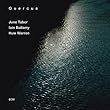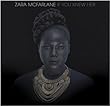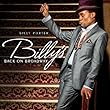 Battles hasn’t been the same without Tyondai Braxton. As much is obvious when you listen to Tyondai’s 2009 Central Market, a haunting homage to Stravinsky’s Ballet Petrushka and the 2008 market crash, beside Battles’ 2011 album, a year after he left, Gloss Drop. Their first album, Mirrored, showed quirkiness that demanded serious attention. More Aubrey Plaza than Zooey Deschanel. Now Battles returns with La Di Da Di, an album as benign as its name, hovering between considerable monotony and death throes.
Battles hasn’t been the same without Tyondai Braxton. As much is obvious when you listen to Tyondai’s 2009 Central Market, a haunting homage to Stravinsky’s Ballet Petrushka and the 2008 market crash, beside Battles’ 2011 album, a year after he left, Gloss Drop. Their first album, Mirrored, showed quirkiness that demanded serious attention. More Aubrey Plaza than Zooey Deschanel. Now Battles returns with La Di Da Di, an album as benign as its name, hovering between considerable monotony and death throes.
Tag: music
A review of Rrose to the Occasion by John Cage and Thomas Wulffen
 Cage wrote once that chance (the use of aleatory procedures in composition) liberated him ‘from what I had thought to be freedom and which actually was only the accretion of habits and tastes.’ He abhorred whatever was consistent and predictable, hence his difficulties with German (though not only German) organisers, alluded to here. His creative ambition was to always transcend himself, and clearly this was for Cage an existential (spiritual) aspiration too.
Cage wrote once that chance (the use of aleatory procedures in composition) liberated him ‘from what I had thought to be freedom and which actually was only the accretion of habits and tastes.’ He abhorred whatever was consistent and predictable, hence his difficulties with German (though not only German) organisers, alluded to here. His creative ambition was to always transcend himself, and clearly this was for Cage an existential (spiritual) aspiration too.
Folk Singer June Tabor with saxophonist Iain Ballamy and pianist Huw Warren in the trio Quercus
 After the opening by saxophone and piano, in the jazz interpretation of Mack Gordon’s “This Is Always,” the singing is first somber then light. “This is love / The real beginning of forever / This isn’t just mid-summer madness,” sings Tabor. The fast pace of the musical accompaniment recurs—excitement, improvisation. A dramatic recitation is made of David Ballantine’s “A Tale from History (The Shooting),” which could be about love or revolution or both, with sudden changes of fate, ambition, and betrayal, death, and regret.
After the opening by saxophone and piano, in the jazz interpretation of Mack Gordon’s “This Is Always,” the singing is first somber then light. “This is love / The real beginning of forever / This isn’t just mid-summer madness,” sings Tabor. The fast pace of the musical accompaniment recurs—excitement, improvisation. A dramatic recitation is made of David Ballantine’s “A Tale from History (The Shooting),” which could be about love or revolution or both, with sudden changes of fate, ambition, and betrayal, death, and regret.
Traveling through Modern African Sounds: Silt by Alsarah and the Nubatones
 “Traveling is one of the most inspiring experiences for me, and so to have been able to travel all over north and east Africa so much recently has been like a blast of fresh air. The best part about being an immigrant (which I consider myself still) is going home and seeing it with an outsider/insider eye… it teaches you more about yourself and your assumptions of who and what your people are, than anything else possibly could,” said the marvelous Alsarah to Addis Rumble’s writers Andreas Hansen and Karen Obling for the newspaper The Guardian/Guardian African Network (September 24, 2013).
“Traveling is one of the most inspiring experiences for me, and so to have been able to travel all over north and east Africa so much recently has been like a blast of fresh air. The best part about being an immigrant (which I consider myself still) is going home and seeing it with an outsider/insider eye… it teaches you more about yourself and your assumptions of who and what your people are, than anything else possibly could,” said the marvelous Alsarah to Addis Rumble’s writers Andreas Hansen and Karen Obling for the newspaper The Guardian/Guardian African Network (September 24, 2013).
Imperfect People Keep Promises Too: Zara McFarlane’s album If You Knew Her
 Zara McFarlane’s If You Knew Her begins with the beautifully spare arrangement given “Open Heart,” and McFarlane’s singing intense and sensual as well as clear and precise, declaring “an open heart is both a lock and key.” With jazz percussion, sparkling and strong piano playing, and a lightly rhythmic vocal approach, “Her Eyes” is conversational, fresh, pretty. Within the pleasantly firm rhythm of “Move,” a girlish delicacy delivers lyrics of quest, doubt, and determination: “If you find me, I’ll be on my knees trying to be me,” supplication before another being’s heart and soul.
Zara McFarlane’s If You Knew Her begins with the beautifully spare arrangement given “Open Heart,” and McFarlane’s singing intense and sensual as well as clear and precise, declaring “an open heart is both a lock and key.” With jazz percussion, sparkling and strong piano playing, and a lightly rhythmic vocal approach, “Her Eyes” is conversational, fresh, pretty. Within the pleasantly firm rhythm of “Move,” a girlish delicacy delivers lyrics of quest, doubt, and determination: “If you find me, I’ll be on my knees trying to be me,” supplication before another being’s heart and soul.
The Dark Comic Beauty of Innuendoes and Truth: Brandy Clark’s album 12 Stories
 In working class lives in different parts of the country, divine intervention and the lottery are the only prospects for change, and one hears that on country singer-songwriter Brandy Clark album 12 Stories, especially in the song “Pray to Jesus,” a sad and honestly reflective song. “We keep our crazy hidden until we’re pushed off the deep end,” sings Brandy Clark in the country rock song “Crazy Women,” in which Clark declares that “crazy women are made by crazy men.”
In working class lives in different parts of the country, divine intervention and the lottery are the only prospects for change, and one hears that on country singer-songwriter Brandy Clark album 12 Stories, especially in the song “Pray to Jesus,” a sad and honestly reflective song. “We keep our crazy hidden until we’re pushed off the deep end,” sings Brandy Clark in the country rock song “Crazy Women,” in which Clark declares that “crazy women are made by crazy men.”
Let the Dark Come Upon You: Juba Dance, the album by Guy Davis
 Guy Davis is one of those artists who makes perceptible the content—the allusions to, and quotations of, different kinds of music—of the blues. “Named after a form of expression that originated in West Africa and involves foot-stomping and patting of the arms, legs, chest and cheeks, juba—also known as hambone—was brought to the New World via the slave trade and was a precursor to the blues. In many ways, it was used as an attempt to dance away one’s sorrows.
Guy Davis is one of those artists who makes perceptible the content—the allusions to, and quotations of, different kinds of music—of the blues. “Named after a form of expression that originated in West Africa and involves foot-stomping and patting of the arms, legs, chest and cheeks, juba—also known as hambone—was brought to the New World via the slave trade and was a precursor to the blues. In many ways, it was used as an attempt to dance away one’s sorrows.
Imagination is More than Identity: Billy Porter’s song collection Billy’s Back on Broadway
 Billy Porter has made a splash with the theatrical production Kinky Boots, about a black male who likes wearing dresses and designs shoes, Lola (the show was inspired by a film of the same name, Kinky Boots, starring Chiwetel Ejiofor). Billy Porter has referred to his Lola as a gender illusionist. There is anguish and play and rebellion in a man wearing the clothes of a woman: spiritual fulfillment and political transgression.
Billy Porter has made a splash with the theatrical production Kinky Boots, about a black male who likes wearing dresses and designs shoes, Lola (the show was inspired by a film of the same name, Kinky Boots, starring Chiwetel Ejiofor). Billy Porter has referred to his Lola as a gender illusionist. There is anguish and play and rebellion in a man wearing the clothes of a woman: spiritual fulfillment and political transgression.
Grace, Strength, Joy, and Blessedness: Beautiful Life by Dianne Reeves
 Dianne Reeves is a gracefully mature singer, with beauty of sound, intelligence, pride, range, and taste. The song selection on her recording Beautiful Life is good and its production quality pristine. It is a very pleasing collection. Dianne Reeves brings depth, individuality, and warmth to everything she sings. “Dreams” and “Waiting in Vain” are two unique, late twentieth-century popular music standards, the first rock (Stevie Nicks) and the second reggae (Bob Marley), and here presented as jazz ballads with elegance and sensitivity.
Dianne Reeves is a gracefully mature singer, with beauty of sound, intelligence, pride, range, and taste. The song selection on her recording Beautiful Life is good and its production quality pristine. It is a very pleasing collection. Dianne Reeves brings depth, individuality, and warmth to everything she sings. “Dreams” and “Waiting in Vain” are two unique, late twentieth-century popular music standards, the first rock (Stevie Nicks) and the second reggae (Bob Marley), and here presented as jazz ballads with elegance and sensitivity.
Geography of Mind: Dawn Upshaw and Maria Schneider’s Winter Morning Walks
 A quiet, tender description of nature, of quiet growth, is found in “Perfectly, Still This Solstice Morning,” one of the poems by Ted Kooser that has been set to music by Maria Schneider and sung by Dawn Upshaw on Winter Morning Walks: the collection of songs is the kind of music that can easily become a part of one’s life, for both its sound and its thoughts, as it captures existence, movement in nature and world, illness, and recovery.
A quiet, tender description of nature, of quiet growth, is found in “Perfectly, Still This Solstice Morning,” one of the poems by Ted Kooser that has been set to music by Maria Schneider and sung by Dawn Upshaw on Winter Morning Walks: the collection of songs is the kind of music that can easily become a part of one’s life, for both its sound and its thoughts, as it captures existence, movement in nature and world, illness, and recovery.